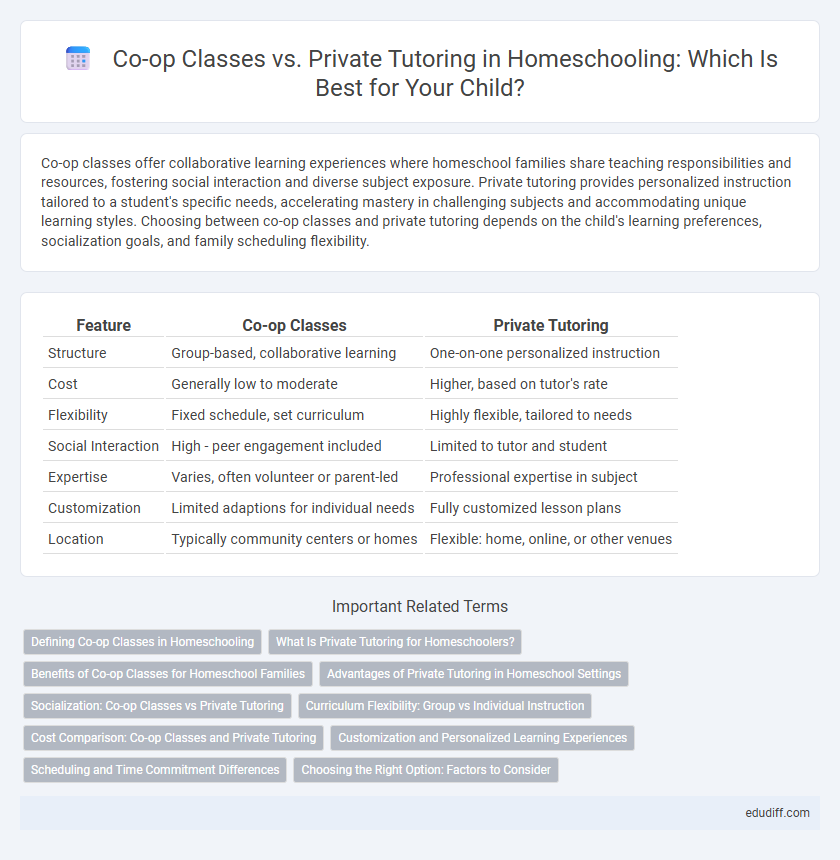Co-op classes offer collaborative learning experiences where homeschool families share teaching responsibilities and resources, fostering social interaction and diverse subject exposure. Private tutoring provides personalized instruction tailored to a student's specific needs, accelerating mastery in challenging subjects and accommodating unique learning styles. Choosing between co-op classes and private tutoring depends on the child's learning preferences, socialization goals, and family scheduling flexibility.
Table of Comparison
| Feature | Co-op Classes | Private Tutoring |
|---|---|---|
| Structure | Group-based, collaborative learning | One-on-one personalized instruction |
| Cost | Generally low to moderate | Higher, based on tutor's rate |
| Flexibility | Fixed schedule, set curriculum | Highly flexible, tailored to needs |
| Social Interaction | High - peer engagement included | Limited to tutor and student |
| Expertise | Varies, often volunteer or parent-led | Professional expertise in subject |
| Customization | Limited adaptions for individual needs | Fully customized lesson plans |
| Location | Typically community centers or homes | Flexible: home, online, or other venues |
Defining Co-op Classes in Homeschooling
Co-op classes in homeschooling refer to group-led educational sessions where families collaborate to teach and learn together, often sharing teaching responsibilities and resources. These classes provide a social learning environment that combines peer interaction with diverse instructional styles, supporting varied educational needs. Co-ops are typically more affordable than private tutoring and offer broader curriculum options through community involvement.
What Is Private Tutoring for Homeschoolers?
Private tutoring for homeschoolers offers personalized, one-on-one instruction tailored to a student's unique learning pace and style, enhancing understanding in specific subjects or skills. Unlike co-op classes, which involve group learning with multiple families, private tutoring provides focused attention and customized lesson plans that address individual academic needs. This approach often results in improved mastery of challenging topics, increased confidence, and flexibility in scheduling.
Benefits of Co-op Classes for Homeschool Families
Co-op classes for homeschool families offer collaborative learning environments that enhance socialization while sharing educational responsibilities among parents, reducing individual teaching burdens. These group settings provide diverse curricula and expert instruction at a lower cost compared to private tutoring, making quality education more accessible. Students benefit from peer interaction, varied teaching styles, and structured schedules, promoting motivation and comprehensive skill development.
Advantages of Private Tutoring in Homeschool Settings
Private tutoring in homeschool settings offers personalized instruction tailored to a child's unique learning pace and style, enhancing academic achievement and confidence. One-on-one sessions allow for immediate feedback and customized lesson plans that address specific strengths and weaknesses, unlike group-based co-op classes which may struggle with individualized attention. This targeted approach supports mastery of complex subjects and fosters a deeper understanding, making private tutoring an effective option for homeschooling families seeking specialized support.
Socialization: Co-op Classes vs Private Tutoring
Co-op classes offer structured socialization opportunities by grouping homeschooled students for collaborative learning, fostering teamwork and communication skills. Private tutoring provides personalized academic support but often limits interaction with peers, potentially reducing social development. Families prioritizing social engagement typically favor co-op classes for their community-building benefits over the one-on-one nature of private tutoring.
Curriculum Flexibility: Group vs Individual Instruction
Co-op classes offer curriculum flexibility by allowing group instruction that fosters collaborative learning and diverse perspectives. Private tutoring provides tailored, individualized curriculum adjustments to meet specific student needs and pacing. This individualized approach ensures a customized learning experience, whereas co-op environments emphasize social interaction and shared resources.
Cost Comparison: Co-op Classes and Private Tutoring
Co-op classes typically offer a more budget-friendly option for homeschooling families, with costs often shared among participants, resulting in lower per-student fees compared to private tutoring. Private tutoring, while providing personalized and tailored instruction, generally comes at a higher hourly rate, ranging from $30 to $100 or more, depending on the tutor's qualifications and subject expertise. Families seeking cost-efficiency often choose co-op classes for group learning and socialization, while private tutoring is preferred for targeted academic support despite its higher expense.
Customization and Personalized Learning Experiences
Co-op classes offer a collaborative learning environment where students benefit from group discussions and shared resources, promoting social interaction alongside customized lesson plans tailored to the group's needs. Private tutoring provides one-on-one instruction with a curriculum specifically designed to address an individual student's strengths, weaknesses, and learning pace, ensuring maximum personalization. Both options enhance personalized learning experiences but differ in the degree of individual customization and peer engagement.
Scheduling and Time Commitment Differences
Co-op classes typically involve set schedules with fixed meeting times several days per week, requiring families to coordinate availability among multiple students and parents. Private tutoring offers flexible scheduling tailored to the student's convenience, often allowing sessions during evenings or weekends to accommodate varying routines. Time commitment in co-ops may demand more consistent attendance and preparation, whereas private tutoring provides focused, individualized sessions that can vary in frequency and duration.
Choosing the Right Option: Factors to Consider
When choosing between co-op classes and private tutoring for homeschooling, consider factors such as social interaction, personalized learning, and cost efficiency. Co-op classes offer collaborative environments with peer engagement, while private tutoring provides tailored instruction that addresses specific academic needs. Evaluating your child's learning style, budget constraints, and desired flexibility will help determine the best fit for effective homeschool education.
Co-op Classes vs Private Tutoring Infographic

 edudiff.com
edudiff.com